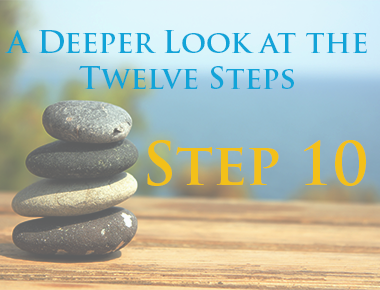
A Deeper Look at the 12 Steps: Step 10
“Continued to take personal inventory and when we were wrong promptly admitted it.”
Recovery takes persistence. It demands constant vigilance. Step 10 asks alcoholics to make self-reflection the habit of a lifetime. It asks them to take the first nine steps to heart and examine their progress on a daily basis, as they make their way through rehab and after they resume their normal lives outside of an affordable alcohol treatment center.
The Work of a Lifetime
Sobriety is a lifetime struggle. It does not come about after someone completes a single step of the Alcoholic Anonymous program or even all 12 steps. It involves the continual application of the principles laid forth throughout the A.A. literature.
Step 10 reflects this hard reality. It is a maintenance step. It introduces no new ideas but reiterates the propositions advanced in previous steps and asks participants to persist in their lifelong journey, their enduring battle to win independence from the chains of addiction.

This tireless pursuit of self-betterment is necessary, not because perfection is achievable but because backsliding is all too easy. Relapses begin the moment someone relaxes their vigilance. The war is lost as soon as one becomes assured of their victory. Such overconfidence is the death knell of sustained sobriety.
By keeping their mind on the goal and their energy on self-improvement, recovering addicts can overcome their substance abuse problems, one day at a time, one temptation at a time. They can fight off the repeat onslaughts of harmful desires and unhealthy routines. As the oft-repeated AA slogan stresses: “progress not perfection.”
Recognizing the Dangers
By now, anyone who has entered a low-cost rehab facility should be familiar with the process of making a personal inventory. They should be accustomed to scrutinizing their own conduct, adjusting their behavior, and making amends to injured parties.
It is through this process that they learn how to conquer their own shortcomings, and it is by continually applying such practices that they learn how to turn resolutions into habits. The key is identifying dangerous emotions—self-pity, bitterness, fear, selfishness—and nipping dangerous actions in the bud.

That kind of attentiveness is easy enough to master at the outset; it’s far more difficult to maintain. Such self-awareness requires that people check their willfulness at the door. It demands resolute humility and an ongoing reliance on a higher power. In other words, it requires all the insights and skills learned throughout the recovery program.
Finally, such progress is impossible to achieve in isolation. Sobriety calls for continual reliance on the support network created during the initial stages of recovery. Even if someone has already completed their stay at a treatment center, it’s necessary to maintain a strong connection with the friends, counselors, and groups
At Yellowstone Recovery, we’re dedicated to helping people through the entire recovery process. From residential detoxification programs to sober living arrangements, we provide both support and accountability at every step along the 12-step journey. If you’re struggling with the recovery process, call us at (888) 941-9048.








